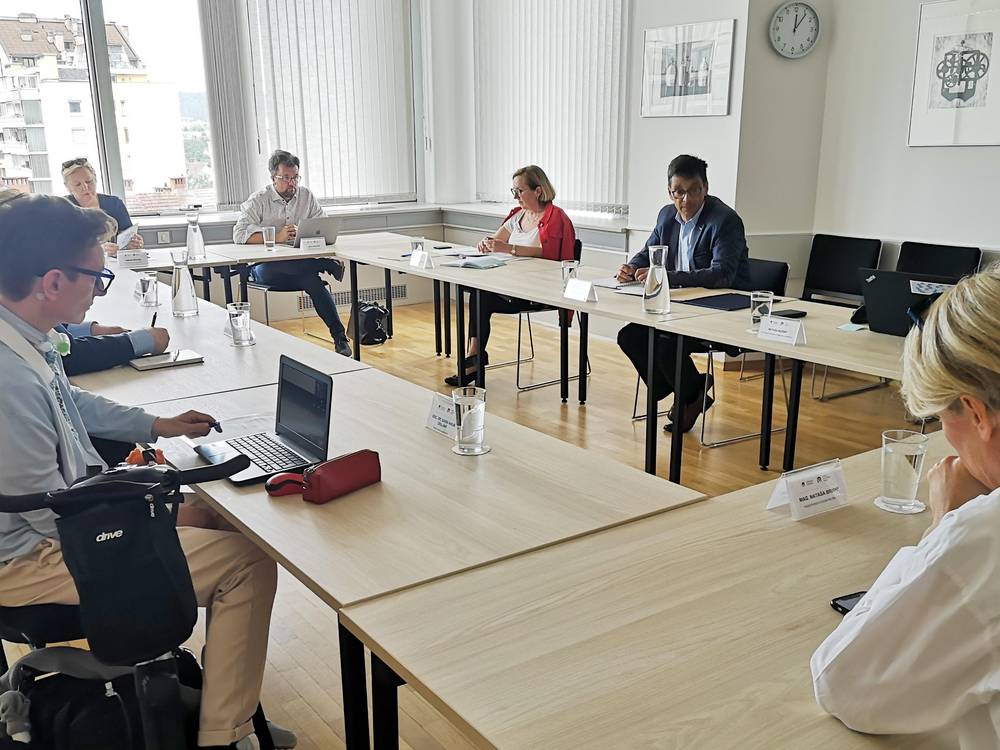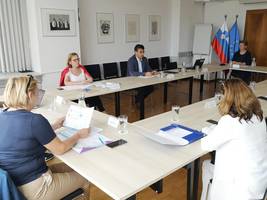Members of the Ombudsman’s Council met at their 8th session on Tuesday, 17 May 2022. The focal point of the agenda was the discussion on the right to healthcare, and they also discussed other topics, such as the care for Ukrainian refugees.
“Human health is one of the most important values and one of the core elements of our lives as it satisfies the need to survive and live with dignity. The efficient protection of the health of every individual leads to the realisation of many other rights and fundamental freedoms,” said Ombudsman Peter Svetina in his introductory speech, who then led the session. He familiarised those present with the fact that the annual report draft of the Ombudsman Institution for 2021 is in its final phase; however, cases in the area of healthcare and health insurance increased last year from 393 to 568, which shows that people are very aware of this right, and that the pandemic has placed the concern for health into another perspective. He also spoke about the realised recommendations of the Ombudsman, where he especially noted some of those that remained unrealised and are to be included in the upcoming annual report.
Members of the Council agreed that the issue concerning the mental health of children and adolescents is especially serious, which was also pointed out in the recent survey of the National Institute of Public Health (NIJZ). “There are several open topics in this area for the government; there is a lack of professionals, and the resolutions of the Constitutional Court remain unrealised in the Mental Health Act,” noted the Ombudsman. There are also many challenges in the area concerning the accessibility of facilities and services, because inaccessibility also prevents disabled persons from exercising their other rights. The implementation of the Long Term Care Act is also much anticipated, which is expected to be realised no sooner than in 2024. The Ombudsman noted that, in line with the law, several projects concerning the care for the elderly have already been initiated; however, they cannot become systemic at this point because the systemic funding will be provided no sooner than in 2025.
Members of the Council agreed that the right to basic healthcare is a basic human right, like food and water, which is why they need to be guaranteed without delay. They have noted that the key priority in healthcare is the establishment of an efficient public healthcare service network for the provision of healthcare with clear responsibilities and obligations of all the service providers (public health institutions and legal entities and private individuals with concessions). The number of family doctors needs to be increased, and measures have to be adopted for the efficient management of long queues on all levels. Focus must also be on the mental health of the entire population, especially children and adolescents, because the consequences of untimely action or no action at all are heavy and long-lasting.
Members of the Council also spoke about the recommendation of the Ombudsman’s Council which the Ombudsman submitted to the government, namely that the assessment of the impact of the drafts of laws on human rights should be placed into the legislation procedures as mandatory. The government did not consider the recommendation of the Ombudsman; however, Peter Svetina said that the Institution will include this in their Annual Report. Members of the Council supported the intention and noted that the Constitutional Court, with their decisions on the non-compliance of the government’s measures with human rights, indirectly confirmed that the placement of the assessment regarding the impact on human rights before the adoption of any law is urgent.
Members of the Council were outraged at the fact that the Government of the Republic of Slovenia has failed to respond to the re-appointment of Vasilka Sancin, PhD, member of the Ombudsman’s Council, into the UN Human Rights Committee in due time. They agreed that a country which has their highly skilled professionals as representatives in such important bodies may only record gains in the area concerning the protection of human rights.
They also spoke about the conditions caused by the war in Ukraine. They expressed their concern for the refugees and noted some of the cases concerning the increased risk of abuse. There is no control over who offers accommodation or employment to Ukrainian refugees, and many of them are faced with issues and long-term procedures in the obtainment of appropriate documents.
They have noted that the government’s reliance on commitments from international contracts is insufficient, and they are falling behind on their reports in several areas. They have found that the Inter-service commission for the monitoring of human rights last met in December 2019. They are also several years behind on their reports on the monitoring of the realisation of rights under the Convention on the Rights of Persons with Disabilities. The Ombudsman noted that this is an unresolved systemic approach. Members of the Council noted that a sustainable mechanism for monitoring the realisation of human rights must be established urgently, and should not depend on changes in the government or the fluctuation of staff.
They also spoke about the unresponsiveness of some state bodies to the demands of the Ombudsman, which is in conflict with the principle of good management and rule of law. The Ombudsman will also speak about the importance of timely and substantive communications and realisations of the Ombudsman’s recommendations with members of the upcoming government. “The pandemic has shown that if the previous government had implemented the recommendations of the Ombudsman, then many systemic problems would have already been resolved and they would not have caused such profound consequences,” warned Peter Svetina.

![[Translate to English:] Omizje članov Sveta](/fileadmin/_processed_/8/1/csm_Osma_seja_Sveta___17_5_2022__1__a_a876cd0b77.jpg)
